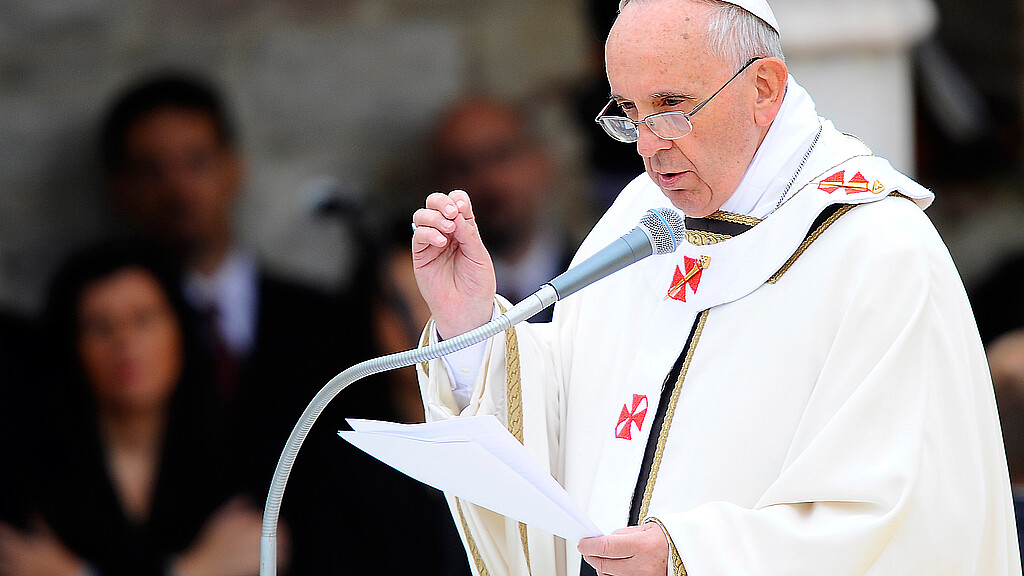Human Rights
Pope Francis denounces laws criminalizing homosexuality as "unjust"
Francis said that while homosexuality may be a “sin” as are many other acts it is not a crime and should not be prosecuted as such

January 25, 2023 8:02am
Updated: January 25, 2023 1:10pm
Pope Francis has denounced the criminalization of homosexuality, calling such laws “unjust,” while also making a plea for outdated statutes to be repealed. The pope called upon all Catholic bishops to join him in his crusade, saying that the church should welcome all LGBTQ people into the church.
“Being homosexual isn’t a crime,” the pope said during a Tuesday interview with The Associated Press.
Francis said that while homosexuality may be a “sin” as are many other acts it is not a crime and should not be prosecuted as such.
“Being homosexual is not a crime,” he said. “It’s not a crime. Yes, but it’s a sin. Fine, but first let’s distinguish between a sin and a crime… It’s also a sin to lack charity with one another.”
The pope also said he believes that laws still criminalizing homosexuality are outdated and should be repealed, echoing the position of the United Nations and the prevailing jurisprudence in the United States.
The United Nations has repeatedly called for laws criminalizing homosexuality to be repealed, saying they violate the fundamental rights of individual freedom and privacy and violate member commitments to protect the rights of all people under international law irrespective of their gender identity or sexual orientation.
The pope said Tuesday any laws criminalizing homosexuality are “unjust,” adding that the Catholic Church should work toward getting them repealed. “It must do this. It must do this,” he said.
He also suggested that those Catholic bishops that support the criminalization of homosexuality or the LGBTQ community need to recognize the dignity of all, irrespective of their sexuality.
“These bishops have to have a process of conversion,” he said, adding that they should apply “tenderness, please, as God has for each one of us.”
Today, an estimated 67 countries or jurisdictions worldwide criminalize consensual same-sex sexual activity, and 11 impose the death penalty, according to The Human Dignity Trust, which is actively working against such laws.
Such laws are common in Middle East and Africa and are inspired by Islamic law. In Western countries they date back to British colonial times.
Some legal experts say that while some of the laws are not enforced, they help reinforce bullying and harassment, creating a false justification for violence against LGBTQ people.
The U.S. has repealed such laws under a 2003 Supreme Court ruling but some states still have such outdated laws on the books. Those laws have no legal force under since the Supreme Court is considered “the supreme law of the land” and federal law trumps state and local law.
Francis quoted the Catechism of the Catholic Church in his herald to treat gay people with respect, and said they should be welcomed.
“We are all children of God, and God loves us as we are and for the strength that each of us fights for our dignity,” Francis said, telling the Associated Press during an interview that reportedly took place in the Vatican hotel where he lives.
While Pope Francis has adopted this cause as a crusade, some other bishops in the Catholic community have opposed his views, arguing that homosexual activity is “intrinsically disordered.”
In 2019, Francis met with the Vatican No. 2, who reaffirmed “the dignity of every human person and against every form of violence.”
He has publicly ministered people in the gay community since his famous 2013 declaration, “Who am I to judge?”
Previously, as the Argentinian archbishop of Buenos Aires, Francis supported legal protection to same-sex couples as an alternative to gay marriage.
In 2021, he issued a controversial decree approving same sex unions that received criticism from the Vatican, “because God cannot bless sin.”
The Vatican has urged countries to halt “unjust discrimination” against gay people but has not signed on to a 2008 U.N. declaration calling for decriminalization.






